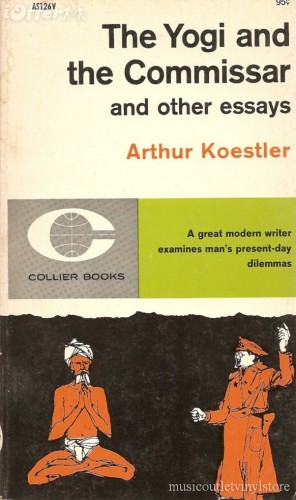vendredi, 16 septembre 2011
The Yogi & the Commissar
Dominique VENNER:
The Yogi & the Commissar
Translated by M. P.
Ex: http://www.counter-currents.com/
 Arthur Koestler, the author of Le zéro et l’infini (in English, Darkness at Noon [2]
Arthur Koestler, the author of Le zéro et l’infini (in English, Darkness at Noon [2]), once played an important role in the Spanish Civil War as an agent of the Comintern. Through his writings, he set the tone of an anti-Francoist propaganda that has endured. Later, his deceptions made him an acute critic of Stalinism.
In the summer of 1942, he published a text that marked his rupture: Le yogi et le commissaire (The Yogi and the Commissar [3]). Two theories, he wrote, claim to liberate the world from the evils that overwhelm it.
The first, that of the commissar (communist), advocates transformation from without. It professes that all the evils of humanity, including constipation, can and must be cured by revolution , that is to say by the reorganization of the system of production.
On the other side, the theory of the yogi holds that salvation is only from within, and that only the spiritual effort of the individual, his eyes on the stars, can save the world.
But history, Koestler concluded, had established the bankruptcy of the two theories. The first had led to the worst massacres and the second led to the passive toleration of everything. It is well-argued and totally depressing.
But I do have a reservation. Why is it even necessary to “save” the world? And to save it from what, exactly? The answer is in the old idea of the Fall and in the more recent idea of Progress. Both imply the idea of salvation. If the opposed ideas of the yogi and the commissar had made so many converts in the West in the twentieth century, it is because people had long been in the habit of thinking of life in terms of redemption or of emancipation.
It has not always been so. Ancient Greece, for example, had a wholly different approach, quite close to that of traditional Japan. No intention of changing the world, but the will to construct and to lead one’s life in pursuit of excellence. It was a form of real spirituality in immanence, but they did not know that.
It had its source in the work of Homer, whom Plato called “the educator of Greece.” Homer had expressed an ethical ideal, that of the kalos k’agathos, the handsome and noble man, an aristocratic ideal adopted by all Greeks in the classical era. But this ideal was never regarded as a spirituality. On the contrary, the philosophers had often denigrated it by insisting that only their speculations led to wisdom.
In spite of everything, however, this ideal has not ceased to nourish an essential part of the noblest European behavior, but never in an explicit fashion. Largely due to a complete misinterpretation of the idea of spirituality.
It is necessary to understand that spirituality is distinct from the mystiques of the void. It is independent of the supernatural. It is what rises above brute materiality and utility, giving a superior meaning to what it touches. Sexual urges belong to materiality, while love is spirituality. There is a legitimate desire for remuneration, but if beyond that, work is pursued solely for profit, it partakes in materialism, whereas it arises from spirituality if its goal is accomplishment.
In other words, what matters is not what one does, but how one does it. To aim at excellence in a gratuitous fashion, for the beauty that it bears and founds, is the European form of spirituality, whether it is a matter of a housewife decorating her home, the self-disipline of a soldier, or the training of a horse.
These reflections may seem frivolous in the face of the great historical stakes of our times. But in reality, they are largely controlled by spirituality and its opposite. Unlike animals, men are not programmed by instinct. Their behavior depends on moral, religious, or ideological — thus spiritual — representations.
For want of having been formulated, recognized, and claimed, the authentic European spirituality is unknown. And the more one advances into the era of triumphant technique, the more it is masked by a suffocating materialism. Whence the illusory attraction for Eastern spiritualities, the “yogi” as Koestler said. To be reborn, however, Europeans will wash off the stains of our time neither on the banks of the Ganges nor in Tibet that but from wellsprings our own.
Source: http://euro-synergies.hautetfort.com/archive/2011/09/07/le-yogi-et-le-commissaire.html [4]
Article printed from Counter-Currents Publishing: http://www.counter-currents.com
00:05 Publié dans Nouvelle Droite, Réflexions personnelles | Lien permanent | Commentaires (0) | Tags : nouvelle droite, dominique venner, réflexions personnelles, arthur koestler |  |
|  del.icio.us |
del.icio.us |  |
|  Digg |
Digg | ![]() Facebook
Facebook



Les commentaires sont fermés.